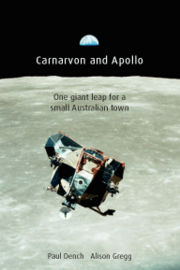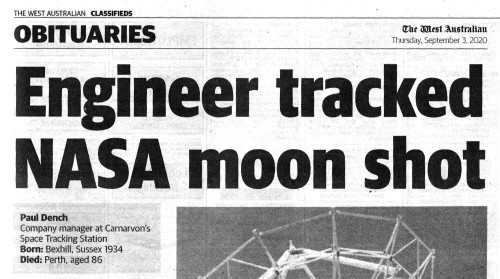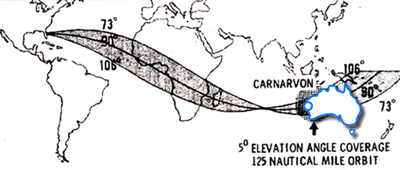Welcome to CarnarvonSpace
| Revision as of 04:21, 7 December 2006 (edit) Paul (Talk | contribs) (→Site in very early stages of construction) ← Previous diff |
Current revision (09:33, 17 September 2020) (edit) Admin (Talk | contribs) |
||
| Line 1: | Line 1: | ||
| - | == Site in very early stages of construction== | + | : |
| + | [[Image:Cover.jpg|right|thumbnail|1000pix|Book cover, 2010, shows -<BR> 'The return of the Eagle'; <BR>Photo: NASA; <BR> Cover: Catrionadesign.]] | ||
| + | <div style="font-size: 16px;"> | ||
| + | This site celebrates Western Australia's role in Space research and, in particular, Carnarvon's critical role supporting NASA's Gemini, Apollo and Skylab projects. The companion book, '''''"Carnarvon and Apollo: One giant leap for a small Australian town "''''', published by '''Rosenberg Publishing''', may be available by order through Carnarvon's '''Space & Technology Museum''' or its '''Tourist Information Centre'''. Please contact them directly regarding any orders. | ||
| + | : | ||
| - | [[Image:Q6Radar.jpg|right|thumb|FPQ-6 Radar Antenna: Photo; Hamish Lindsay]] | + | '''Margaret Medcalf Award 2011 - Special Commendation'''<BR> |
| + | “This work links Western Australian social history to the international history of science and technology in a highly readable way. Its lively exploration of Carnarvon's critical role in support of NASA space missions reminds us that history in living memory is no less surprising than the events of long ago. The use of maps, cartoons, photographs and personal reminiscences enhance the appeal of an intriguing story."<BR><BR clear=all> | ||
| + | </div> | ||
| + | == LOS - Paul Dench == | ||
| - | This site complements the forthcoming book by Paul Dench and Alison Gregg: <I>'Carnarvon & Apollo: | + | [[Image:Obit.jpg|right|thumb=ObitHeader.jpg]] |
| - | One Giant Leap for a Town'</I>. Both book and website will tell the extraordinary story of how Carnarvon | + | <div style="font-size: 16px;"> |
| - | (population 2500, in the remote northwest of Australia) became the location for the world's largest space | + | Paul Dench, this site's creator, passed away in June 2020. To find out more about his life and career, see the obituary to the right, published in the West Australian in September. |
| - | tracking station outside mainland USA. Learn how and why this happened, and celebrate the work of the | + | </div> |
| - | [[NASA's Carnarvon Space Tracking Station]] (call-sign <B>CRO</B>), the [[Carnarvon OTC Earth Station]] (established to ensure reliable communications for <B>CRO</B>), and the life and times of Carnarvon people during those exciting years. | + | <br clear=all> |
| - | Public interest in Space research in Western Australia had grown from the early 1960s, spurred on by the work of the small Muchea Tracking Station near Perth and the excitement of seeing for the first time satellites orbiting overhead. On 20 February 1962 Perth achieved fame as 'The City of Light' when Astronaut John Glenn described seeing the lights of Perth left burning through the night to welcome him. | + | == Contents == |
| - | NASA's next generation of manned spaceflight projects required a more intense level of technical | + | [[Image:Pathway.jpg|right|frame|size 1000x500pix|Apollo's path to the Moon crossing Carnarvon;<br>NASA map, modified by Catriona Designs]] |
| - | support from stations better suited to the orbital inclinations needed to send a spacecraft to | + | |
| - | the Moon. Carnarvon was ideally placed. In August 1962 NASA announced that work would begin immediately | + | |
| - | on establishing the Carnarvon Space Tracking Station to support its planned Gemini and Apollo missions. | + | |
| - | From 1963 until its closure in 1975 the Carnarvon Space Tracking Station supported a | + | |
| - | huge range of scientific and exploratory missions - manned and unmanned - through NASA's peak years of | + | |
| - | operations in the race to put a man on the Moon. | + | |
| + | <br><br> | ||
| + | [[Overview|Overview of Carnarvon's role]] | ||
| - | [[Image:Southernsite.jpg|none||frame|size 1000x500px|The southern end of the CRO site: at top is T&C, USB & Troposcatter, centre is Power Station, UHF Command & SPAN, and botton is R&RR]] | + | [[NASA's Carnarvon Space Tracking Station|NASA's Carnarvon Space Tracking Station]] |
| + | [[Carnarvon OTC Earth Station|OTC Satellite Earth Station Carnarvon]] | ||
| - | Carnarvon's role in Space did not end there, however. In 1966 the Overseas Telecommunication Commision, Australia, had established the nearby [[Carnarvon OTC Earth Station]] - Australia's first. Later it assumed a tracking role for the European Space Agency. Its last major function was the prime command role for the Giotto mission's rendezvous with Halley's Comet in March 1986. This station closed in 1987. | + | [[Carnarvon Space & Technology Museum|Carnarvon Space & Technology Museum]] |
| - | Since then Carnarvon Shire Council and other groups have worked together to convert the remaining | + | [[Western Australia in Space|Western Australia in Space]] |
| - | OTC dishes and buildings to form the nucleus of the [[Western Australian Space Museum Carnarvon]]. | + | |
| - | Although this is still under development, it is hoped that it will eventually provide a full record of WA's | + | |
| - | significant involvement in space technology and exploration. | + | |
| - | ---- | + | <br clear=all> |
| - | <SMALL><B>Contact Authors ... mailto:info@carnarvonspace.com <BR> | + | == Related 'Carnarvon Tracking Station' web-sites == |
| + | Terry Kierans's <B>CROtrak</B> at http://crotrak.com/<BR> | ||
| + | |||
| + | <B>'Other Stations'</B> on Colin Mackellar's http://www.honeysucklecreek.net | ||
| ---- | ---- | ||
| - | + | Email '''info@carnarvonspace.com''' . . . to contact site manager, Phil Dench (Paul's son)<BR> | |
| - | == Related Carnarvon web-sites == | + | |
| - | + | ||
| - | Terry Kierans' CROtrak at http://www.crotrak.com/<BR> | + | |
| - | + | ||
| - | and under 'Other Stations' at http://www.honeysucklecreek.net </B></SMALL> | + | |
Current revision
This site celebrates Western Australia's role in Space research and, in particular, Carnarvon's critical role supporting NASA's Gemini, Apollo and Skylab projects. The companion book, "Carnarvon and Apollo: One giant leap for a small Australian town ", published by Rosenberg Publishing, may be available by order through Carnarvon's Space & Technology Museum or its Tourist Information Centre. Please contact them directly regarding any orders.
Margaret Medcalf Award 2011 - Special Commendation
“This work links Western Australian social history to the international history of science and technology in a highly readable way. Its lively exploration of Carnarvon's critical role in support of NASA space missions reminds us that history in living memory is no less surprising than the events of long ago. The use of maps, cartoons, photographs and personal reminiscences enhance the appeal of an intriguing story."
LOS - Paul Dench
Paul Dench, this site's creator, passed away in June 2020. To find out more about his life and career, see the obituary to the right, published in the West Australian in September.
Contents
NASA's Carnarvon Space Tracking Station
OTC Satellite Earth Station Carnarvon
Carnarvon Space & Technology Museum
Related 'Carnarvon Tracking Station' web-sites
Terry Kierans's CROtrak at http://crotrak.com/
'Other Stations' on Colin Mackellar's http://www.honeysucklecreek.net
Email info@carnarvonspace.com . . . to contact site manager, Phil Dench (Paul's son)



